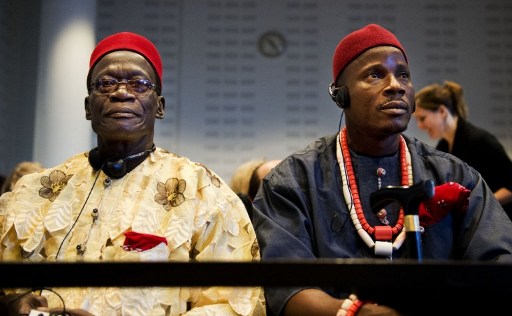The appeal in the case of four Nigerian farmers and Milieudefensie (Friends of the Earth Netherlands) versus Shell continued for two days from Friday, October 8, 2020 in The Hague.

In this final phase of the case which was started in 2008, the following questions are said to be key: did Shell do enough to prevent spills from occurring and were the spills adequately cleaned up after they took place? The issue of whether Shell’s headquarters is responsible for the Nigerian operations is also being addressed. Over the last period, the farmers’ lawyers have gathered new evidence on all of these points, which have been presented to the court.
The Nigerian Plaintiffs
The lawsuit was at the time filed by Milieudefensie together with four farmers from three villages in the Niger Delta. Shell’s leaking pipelines have allegedly made life in these villages nearly impossible. Before the spills, the farmers were reportedly able to provide a satisfactory living for themselves.
But, since the oil spills have occurred, that is no longer possible, according to sources, who claim that families in the villages live in poverty, in unhealthy surroundings, and children and the elderly often succumb to illness and death caused by the oil pollution.
Two out of the four original Plaintiffs are said to be deceased. Alali Efanga did not live to see the lawsuit resolved; he died in 2016. Another plaintiff, Barizaa Dooh, died previously – his son Eric has become appellant in the case.
“We have here today an ageing and sickly Elder Friday Alfred Akpan of Ikot Ada Udo who won his case but has not reaped the benefit of that because of the current Appeal in the Hague; an ageing and now blind Chief Fidelis Oguru of Oruma who is waiting anxiously for the outcome of his Appeal and High Chief Eric Barizaa Dooh of Goi and Princewill Alali Efanga of Oruma who both have lost their parents in course of this litigation and are expectant of the outcome of this Appeal,” disclosed the source.
Ground-breaking Case
In 2008, it was the first time that a Dutch company ever had to appear before a Dutch court to account for environmental damage caused abroad. This, it was gathered, makes this case unique.
In the case, Milieudefensie and the farmers are suing both the Shell Petroleum Development Company of Nigeria (SPDC – Shell’s subsidiary in Nigeria) and Royal Dutch Shell (Shell’s headquarters in the Netherlands). In a previous verdict, the Court ruled in favour of Milieudefensie: Royal Dutch Shell in the Netherlands could be held accountable. Shell must therefore be held to account before the Dutch court. This verdict also has significance for other victims of Dutch multinationals.
New Evidence Against Shell
Channa Samkalden, the lawyer for the four farmers and Milieudefensie, is said to acquired new evidence in the case. Shell was ordered by the Court to provide access to certain documents, such as audit reports and internal letters. Other evidence, on the management of Nigerian operations from The Hague in the Netherlands, came from alleged criminal proceedings in Italy against Shell.
“Shell has always denied its direct involvement in oil production by the company in the Niger Delta. But various internal documents clearly show that Shell is involved in the activities (and priorities) of its subsidiary in Nigeria. And it was well known in the Netherlands that things were going seriously wrong in Nigeria, resulting in large-scale environmental damage. Nevertheless, other (financial) matters took precedence.
“Moreover, experts appointed by the Court have made it clear that Shell’s own investigation into the cause of the spills is flawed. For years, Milieudefensie has held that the so-called JIT (Joint Investigation Team) reports are unreliable, and this has now finally been independently confirmed.
“There is also new evidence regarding the degree of pollution and the clean-up of the polluted areas. Edelman soil consultants has examined the clean-up activities and concluded that Shell’s methods do not meet basic standards.”
The Demands
The farmers and Milieudefensie want Shell to clean up the oil, something that is beleived not yet been done adequately. Studies carried out by the UN also indicate that Shell has not sufficiently cleaned up the Niger Delta. In addition, Shell must pay compensation to the affected farmers and their communities, as their source of income has been lost due to the oil spills. Shell must also do more to prevent new spills, including better maintenance of the pipelines.
Donald Pols, director of Milieudefensie, said: “Big companies can do whatever they want in a country like Nigeria. The Dutch government hardly sets any rules for the way in which multinationals can operate abroad.
“Because these regulations are lacking, the lives of ordinary citizens can be destroyed completely. If such regulations existed, a lawsuit such as this would not have been necessary. I call on the government to take action on this matter.”
Chima Williams, Ag. Executive Director of Environmental Rights Action/Friends of the Earth Nigeria (ERA/FoEN), affirmed: “These type of cases wouldn’t have been necessary assuming all the multi-national companies operating in Nigeria had respect for the rights of the Nigerian citizens and their environment or where there were breaches, offered immediate remedies.
“The Nigerian governments should support the efforts of her citizens to bring the extractive companies to remedy the harm caused her citizens and their environment to pave way for a healthy relationship between the citizens, companies and government.”
Nnimmo Bassey, Chair of ERA/FoEN Board, stated: “These cases have been at the courts in Holland for too long almost making it look like a Nigerian Court case. The court should fast track and deliver judgment so that the parties can know their fate and sort out this matter once and for all as the entire Niger Delta needs to be cleaned up.”
